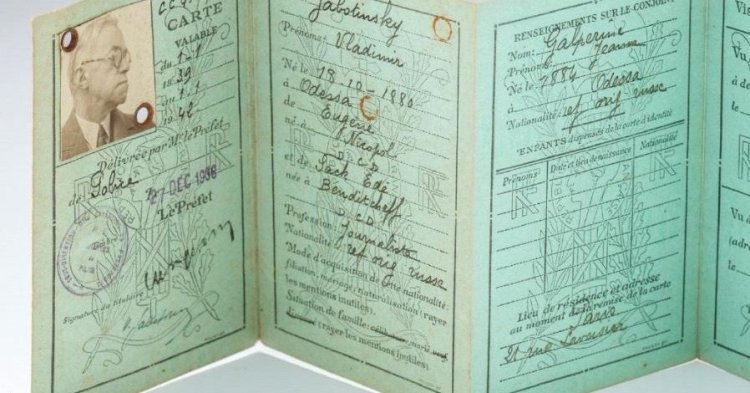“Beyond these cities stretches a continuous sea of almost thirty million Ukrainians. Please try to take a peek not only at its center[...] try to look at its frontier, to the Kharkov or to the Voronezh governorates, near the same strait[...] [where there are] villages inhibited by”Khokhols“[Ukrainians], and beyond there”Katzeps“[Russians]. They live apart for generations upon generations and do not interfere with each other. Each speaks in his own language, dresses according to his way, strictly adheres to his customs; marry only among themselves; They alienate each other, do not understand their counterparts, and do not seek to understand.”
Ze’ev (Vladimir) Jabotinsky, then an Odessa born young journalist, and later, the future founder of revisionist Zionism, wrote these words in 1911 against both liberal and conservative intelligentsia of Tsarist Russia and its efforts to promote a policy of “Russification” (the regime’s encouragement, sometimes by force, of assimilation into the Russian language and culture) against its Ukrainian subjects, whom they perceived as members of “the same people.”
In his article, Jabotinsky emphasized what today is taken for granted: the Ukrainians and Russians have never been the same people and it is doubtful whether they were even 1,000 years ago.
The Purpose of the article was to promote the idea of turning the Russian Empire away from the vision of “Orthodoxy, Autocracy and [Russian] Nationality” to the vision of a democratic liberal multi-national federation where each nation (Jews and Ukrainians included) will enjoy considerable autonomy. While clearly the conservative circles couldn’t even imagine such ’horrific blasphemy’, even for the ’Kadet’ party Liberals, which could have considered a greater autonomy for Poland or Finland, the Idea of a separate Ukrainian or Belarussian nation seemed preposterous.
Like in February 2022, in 1911, the Russian intelligentsia mocked these sayings and treated them with complete dismissal. For example, the Russian liberal philosopher and politician, Peter Struve, lashed out against his remarks, stating that dealing with Ukrainian cultural revival is nothing more than a complete waste of time and resources, given that in Russia lives one dominant nation, a Russian nation, which even if divided into three ’tribes’ – ’Great Russians’, ’Little Russians’ and ’White Russians’– It is only a matter of time that the two latter will fully assimilate within the culture of the former as they all have always constituted a single ethnic and national group.
Some 110 years later, Russian President Vladimir Putin repeated these words in an article he published in July 2021 – a few months before the invasion – entitled “The Historical Unity of Russians and Ukrainians”, in which he completely dismissed the existence of a Ukrainian nation, and like Struve before him, Putin stated that it was an artificial false invention, serving as “a plot” to split the single Russian nation.
***
Today, a year ago, the Russian army invaded Ukraine, without any provocation on the part of the latter. Its generals believed that, like in Budapest of 1956 and Prague of 1968, they would enter the country without encountering any significant resistance. The ruling government, although democratically elected, was perceived for them as lacking any public legitimacy, and the masses of the Ukrainian people were perceived as their oppressed countrymen who are waiting for their liberators, whom they will receive with bouquets of roses.
Even in the darkest of scenarios, they believed that if joy will not prevail throughout the entire country, at the very least it would be felt in its Russian-speaking regions of the East (in which “Russification” was historically most prominent), where the very Kharkov region, of which Jabotinsky spoke, was located. However, it was precisely in that governorate, now called “Kharkiv” in Ukrainian, that the Russians encountered fierce resistance.
The Russian soldiers who entered the suburbs heard cries in Russian from the residents, but they were not cries of cheer and joy, but curses and derogatory cries, which were accompanied by the singing of the anthem and the hoisting of the flags of the Ukrainian nation. The attempt to encircle the regional capital quickly failed when the residents enlisted en masse in the fighting forces of the army and the National Guard and drove the invaders away. Many of the residents who were left behind in the occupied suburbs made sure to provide the Ukrainian army with high-quality intelligence, which allowed it, a few months later, to conduct the same impressive counterattack, and to push the Russians out of there as well.
***
Somewhere in the halls of the philosophers of the afterlife, Jabotinsky sits and feels the feeling of an intellectual victory over his rivals, but there is no doubt that this feeling is also mixed with great sadness at the terrible destruction that has been imposed on one nation that has become, through no fault of its own, a victim, and another nation whose leaders have chosen for decades to sink into the same illusions about the splendor of the past and a host of conspiracies that have caused them to start a war that led, in the words of modern Russian national singer Ala Pugacheva, to the “killing of our children for false purposes.”

Follow the comments: |
|
